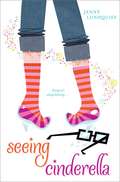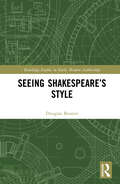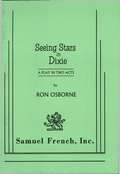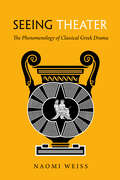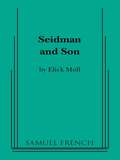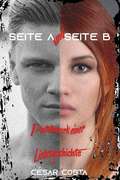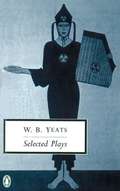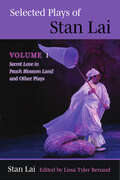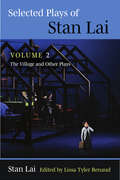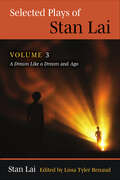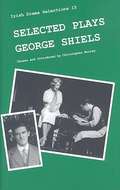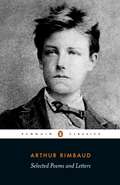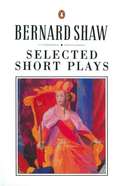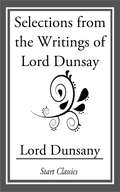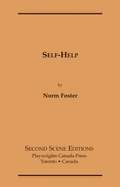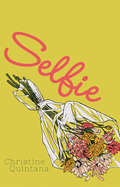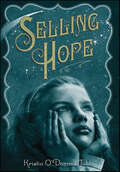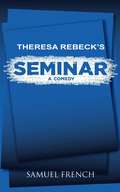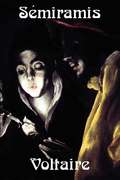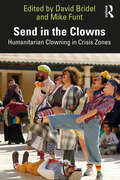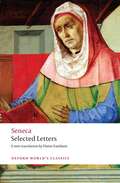- Table View
- List View
Seeing Cinderella
by Jenny LundquistMagical realism and a modern Cinderella story makes for a fun and relatable M!X read.Sixth grade is not going well for Calliope Meadow Anderson. Callie's hair is frizzy, her best friend, Ellen, is acting weird, and to top things off, she has to get glasses. And her new specs aren't even cute, trendy glasses--more like hideously large and geeky. But Callie soon discovers that her glasses have a special, magical perk: When she wears them, she can read people's thoughts. Crazy glasses aside, Callie has more drama to face when she's cast as the lead in the school play--and instead opts to be an understudy, giving the role of Cinderella to Ellen. Can Callie's magic glasses help her see her way to leading lady, or is she destined to stay in the background forever?
Seeing Cinderella
by Jenny LundquistMagical realism and a modern Cinderella story makes for a fun and relatable M!X read.Sixth grade is not going well for Calliope Meadow Anderson. Callie's hair is frizzy, her best friend, Ellen, is acting weird, and to top things off, she has to get glasses. And her new specs aren't even cute, trendy glasses--more like hideously large and geeky. But Callie soon discovers that her glasses have a special, magical perk: When she wears them, she can read people's thoughts. Crazy glasses aside, Callie has more drama to face when she's cast as the lead in the school play--and instead opts to be an understudy, giving the role of Cinderella to Ellen. Can Callie's magic glasses help her see her way to leading lady, or is she destined to stay in the background forever?
Seeing Shakespeare’s Style (Routledge Studies in Early Modern Authorship)
by Douglas BrusterSeeing Shakespeare’s Style offers new ways for readers to perceive Shakespeare and, by extension, literary texts generally. Organized as a series of studies of Shakespeare’s plays and poems, poetry and prose, it looks at the inner functioning of language and form in works from all phases of this writer’s career. Because the very concept of literary style has dropped out of so many of our conversations about writing, we need new ways to understand how words, phrases, speeches, and genres in literature work. Responding to this need, this book shows how visual representations of writing can lead to a deeper understanding of language’s textures and effects. Beginning with chapters that a beginning reader of Shakespeare can benefit from, its second half puts these tools to use in more in-depth examinations of Shakespeare’s language and style. Although focused on Shakespeare’s works, and the works of his contemporaries, this book provides tools for all readers of literature by defining style as material, graphic, and shaped by the various media in which all writers work.
Seeing Stars in Dixie
by Ron OsborneComedic Drama / 1m, 4f / It's 1956 and Hollywood has arrived in Natchez, Mississippi with its brightest stars to film Raintree County . Meanwhile at Clemmie's, a Natchez tea room, the widowed proprietor who has a fascination with movies and a secret admirer, oversees her own cast of characters: Tootie, her take charge friend; Jo Beth, a former beauty queen; Glease, a man more comfortable with women than macho men, and Marjorie, an unethical social climber. Competition for a small role in the movie brings out the best and worst of these memorable characters. Twists, turns and revelations lead Clemmie to trade a moment of fame for love and the chance to impact the lives of people dear to her. Originally produced at the Sonoma County Repertory Theatre in Sebastopol, CA.
Seeing Theater: The Phenomenology of Classical Greek Drama
by Naomi WeissThis is the first book to approach the visuality of ancient Greek drama through the lens of theater phenomenology. Gathering evidence from tragedy, comedy, satyr play, and vase painting, Naomi Weiss argues that, from its very beginnings, Greek theater in the fifth century BCE was understood as a complex interplay of actuality and virtuality. Classical drama frequently exposes and interrogates potential viewing experiences within the theatron—literally, "the place for seeing." Weiss shows how, in so doing, it demands distinctive modes of engagement from its audiences. Examining plays and pottery with attention to the instability and ambiguity inherent in visual perception, Seeing Theater provides an entirely new model for understanding this ancient art form.
Seeing Things
by Alan AckermanA technological revolution has changed the way we see things. The storytelling media employed by Pixar Animation Studios, Samuel Beckett, and William Shakespeare differ greatly, yet these creators share a collective fascination with the nebulous boundary between material objects and our imaginative selves. How do the acts of seeing and believing remain linked? Alan Ackerman charts the dynamic history of interactions between showing and knowing in Seeing Things, a richly interdisciplinary study which illuminates changing modes of perception and modern representational media.Seeing Things demonstrates that the airy nothings of A Midsummer Night's Dream, the Ghost in Hamlet, and soulless bodies in Beckett's media experiments, alongside Toy Story's digitally animated toys, all serve to illustrate the modern problem of visualizing, as Hamlet put it, 'that within which passes show.' Ackerman carefully analyses such ghostly appearances and disappearances across cultural forms and contexts from the early modern period to the present, investigating the tension between our distrust of shadows and our abiding desire to believe in invisible realities. Seeing Things provides a fresh and surprising cultural history through theatrical, verbal, pictorial, and cinematic representations.
Seidman & Son
by Elick MollComedy \ 9 m., 10 f. \ 5 Ints. \ Morris Seidman is a lovable guy who has come up the hard way. His daughter is boy crazy and his son is a militant idealist. Morris has problems at work, too, due to hiring his son. Morris not only loses one of his biggest buyers, but loses some of his most valuable workers. But he did not get to his present position without resources, and in his genial way he concludes about his son that every generation has to learn from its own experiences.
Seite A und Seite B - Patchwork einer Liebesgeschichte
by Cesar Rodrigo Mendonca da CostaRobert entdeckt die Leidenschaft seines Lebens nachdem Jennifer in das Haus gegenüber zieht. Eine unschuldige Liebesgeschichte entfaltet sich zwischen ihnen, voller Begegnungen, Missverständnissen, Freuden und Trauer. Als die Beziehung des Paares sich endlich zum Guten wendet, ist dann plötzlich doch nicht mehr alles so, wie es scheint, denn jede Geschichte hat nicht nur eine Seite. Dieses Buch von Cesar Costa bringt eine dramatische Handlung mit überraschender Wendung und unerwartetem Ausgang mit sich. Wie weit kann eine bedingungslose Liebe gehen? Genre: Romantik, Drama Schlüsselwörter: Cesar Costa, Romantik, Drama, Seite A und Seite B, überraschende Wendung, Überraschunge
Selected Plays (Penguin Modern Classics)
by William YeatsThe 18 plays are: The Shadowy Waters; Cathleen in Houlihan; The Hour Glass; On Baile's Strabd; The Green Helmet; Deirdre; At the Hawk's Well; The Dreaming of the Bones; The Cat and the Moon; The Only Jealousy of Emer; Calvary; Sophocles' King Oedipus; The Resurrection; The Words Upon the Windwo-FPane; The King of the Great Clock Tower; The herne's Egg; Purgatory; The Death of Cuchulain.
Selected Plays of Stan Lai: Volume 1: Secret Love in Peach Blossom Land and Other Plays
by Stan LaiStan Lai (Lai Shengchuan) is one of the most celebrated theatre practitioners working in the Chinese-speaking world. His work over three decades has pioneered the course of modern Chinese language theatre in Taiwan, China, and other Chinese speaking regions. "The preeminent Chinese playwright and stage director of this generation." (China Daily) "The best Chinese language playwright and director in the world." (BBC) Lai's works include masterpieces of the modern Chinese language theatre like Secret Love in Peach Blossom Land, The Village, and his epic 8 hour A Dream Like A Dream, all of which are in this collection. These volumes feature works from across Lai’s career, providing an exceptional selection of a diverse range of performances. Volume One contains: Secret Love in Peach Blossom Land Look Who's Crosstalking Tonight The Island and the Other Shore I Me She Him Ménage à 13
Selected Plays of Stan Lai: Volume 2: The Village and Other Plays
by Stan LaiStan Lai (Lai Shengchuan) is one of the most celebrated theatre practitioners working in the Chinese-speaking world. His work over three decades has pioneered the course of modern Chinese language theatre in Taiwan, China, and other Chinese speaking regions. "The preeminent Chinese playwright and stage director of this generation." (China Daily) "The best Chinese language playwright and director in the world." (BBC) Lai's works include masterpieces of the modern Chinese language theatre like Secret Love in Peach Blossom Land, The Village, and his epic 8 hour A Dream Like A Dream, all of which are in this collection. These volumes feature works from across Lai’s career, providing an exceptional selection of a diverse range of performances. Volume Two contains: Millennium Teahouse Sand on a Distant Star Like Shadows The Village Writing in Water
Selected Plays of Stan Lai: Volume 3: A Dream Like a Dream and Ago
by Stan LaiStan Lai (Lai Shengchuan) is one of the most celebrated theatre practitioners working in the Chinese-speaking world. His work over three decades has pioneered the course of modern Chinese language theatre in Taiwan, China, and other Chinese speaking regions. "The preeminent Chinese playwright and stage director of this generation." (China Daily) "The best Chinese language playwright and director in the world." (BBC) Lai's works include masterpieces of the modern Chinese language theatre like Secret Love in Peach Blossom Land, The Village, and his epic 8 hour A Dream Like A Dream, all of which are in this collection. These volumes feature works from across Lai’s career, providing an exceptional selection of a diverse range of performances. Volume Three contains: A Dream Like a Dream Ago
Selected Plays: George Shiels
by Christopher MurrayContains The Retrievers (hitherto unpublished), Professor Tim, The New Gossoon, The Passing Day, The Rugged Path, and The Summit, bibliographical checklist. George Shiels (1886-1949) was one of the most prolific and most successful playwrights in the history of the Abbey Theatre. Before his debut at the Abbey, Shiels's early work was staged by the Ulster Literary Theatre in Belfast and later on his work was taken up by the dynamic Group Theatre, also in Belfast. As a Northerner, Shiels embraced the whole island in his work, his use of dialect and his characterisation. Moreover, while his plays were broadly popular and wonderfully well suited to the acting talents of theatre companies North and South, his all-Ireland perspective lent his work a keen critical edge masked by easy realism and hilarious comedy. Nowadays, we turn to the dark comedy of a play like The Passing Day to re-adjust our view of Shiels and to see his plays as seriously concerned with the land question and issues of identity, gender and the law in post-colonial Ireland. From that perspective, The New Gossoon and in particular The Rugged Path (which in 1940 broke all previous box-office receipts at the Abbey, when the production played for an unprecedented twelve weeks, all previous plays having been limited to two) challenge us to look again at Shiels and see him as public commentator as well as consummate entertainer.
Selected Poems and Letters
by Arthur RimbaudA phenomenonally precicious schoolboy, Rimbaud was still a teenager when he became notorious as Europe's most shocking and exhilarating poet. During his brief 5-year reign as the enfant terrible of French literature he produced an extraordinary body of poems that range from the exquisite to the obsene, while simultaneously living a life of dissolute excess with his lover and fellow poet, Verlaine. At the age of 21, he abandonned poetry and travelled across Europe before settling in Africa as an arms trader. This edition sets the two sides of Rimbaud side by side with a sparkling translation of his most exhilarating poetry and a generous selection of the letters from the harsh and colourful period of his life as a colonial trader.
Selected Short Plays
by George Bernard ShawThis selection comprises: "THE ADMIRABLE BASHVILLE" "HOW HE LIED TO HER HUSBAND" "PASSION, POISON AND PETRIFACTION" "THE GLIMPSE OF REALITY" "THE DARK LADY OF THE SONNETS" "OVERRULED" "THE MUSIC-CURE" "GREAT CATHERINE" "THE INCA OF PERUSALEM" "O'FLAHERTY V.C." "AUGUSTUS DOES HIS BIT" "ANNAJANSKA, THE BOLSHEVIK EMPRESS" "VILLAGE WOOING" "THE SIX OF CALAIS" and "CYMBELINE REFINISHED".
Selections from the Writings of Lord Dunsay
by Lord DunsanyThese plays and stories have for their continual theme the passing away of gods and men and cities before the mysterious power which is sometimes called by some great god's name but more often "Time." His travelers, who travel by so many rivers and deserts and listen to sounding names none heard before, come back with no tale that does not tell of vague rebellion against that power, and all the beautiful things they have seen get something of their charm from the pathos of fragility. This poet who has imagined colors, ceremonies and incredible processions that never passed before the eyes of Edgar Allen Poe or of De Quincey, and remembered as much fabulous beauty as Sir John Mandeville, has yet never wearied of the most universal of emotions. . . . He can show us the movement of sand, as we have seen it where the seashore meets the grass, but so changed that it becomes the deserts of the world. Only the sand knew and arose and was troubled and lay down again and the wind knew.
Self-Help
by Norm FosterA married pair of second-rate theatre actors cast themselves as nationally renowned self-help gurus. Their lives unravel in a farce as they try to conceal a body and hold on to their falsely won fame.
Selfie
by Christine QuintanaA new year of high school is full of excitement and potential—but three teens didn’t expect it to bring such a dark change to their lives. After spending a summer reinventing herself in Paris, Emma is ready for her new life to start, while her best friend Lily is eager for them to reconnect. Lily throws a last-minute party fuelled by alcohol and Instagram, which leads to a long-awaited encounter between Emma and Lily’s older brother Chris. But the next day Emma feels that something went terribly wrong. When a doctor’s appointment and a visit from police confirm that there was a sexual assault at the party, and the whole school turns against Emma, the three friends grapple with what actually happened between Emma and Chris. This smart and intense play about the complexities of relationships and community opens up a much-needed conversation about the nature of consent.
Selling Hope
by Kristin O'Donnell TubbSelling Hope is an inventive middle grade novel about a girl who wants a normal life and how she sees Halley's Comet as her ticket out of the vaudeville circuit.It's May 1910, and Halley's Comet is due to pass thru the Earth's atmosphere. And thirteen-year-old Hope McDaniels and her father are due to pass through their hometown of Chicago with their ragtag vaudeville troupe. Hope wants out of vaudeville, and longs for a "normal" life -- or as normal as life can be without her mother, who died five years before. Hope sees an opportunity: She invents "anti-comet" pills to sell to the working-class customers desperate for protection. Soon, she's joined by a fellow troupe member, young Buster Keaton, and the two of them start to make good money. And just when Hope thinks she has all the answers, she has to decide: What is family? Where is home? “[An] oft-engaging, pleasantly romantic romp through a fascinating time in America's entertainment history.” —Kirkus Reviews
Sementes de amor
by Uri J. NachimsonAmor, sexo, ambição, as difíceis relações entre dois países vizinhos com culturas e realidades diferentes, que nunca conseguiram sekar a paz. Um amor impossível... todos os ingredientes em uma estória envolvente da primeira à última palavra.
Seminar
by Theresa RebeckNominee! 2012 Drama League Award for Distinguished Production of a Play. In Seminar, a provocative comedy from Pulitzer Prize nominee Theresa Rebeck, four aspiring young novelists sign up for private writing classes with Leonard (JEFF GOLDBLUM), an international literary figure. Under his recklessly brilliant and unorthodox instruction, some thrive and others flounder, alliances are made and broken, sex is used as a weapon and hearts are unmoored. The wordplay is not the only thing that turns vicious as innocence collides with experience in this biting Broadway comedy. "FIVE STARS! Sexy, savvy and uproarious!" - David Cote, Time Out New York
Semiramis
by VoltaireThis scarce antiquarian book is a facsimile reprint of the original. Due to its age, it may contain imperfections such as marks, notations, marginalia and flawed pages. Because we believe this work is culturally important, we have made it available as part of our commitment for protecting, preserving, and promoting the world's literature in affordable, high quality, modern editions that are true to the original work.
Send in the Clowns: Humanitarian Clowning in Crisis Zones
by David Bridel Mike FuntSend in the Clowns presents interviews with twenty-four pioneering humanitarian and activist clowns and thought leaders working in hospitals, refugee camps, orphanages and war zones, and at the sites of street protests and locations of social unrest across the world.This book is built around interviews with some of the world’s leading practitioners of clowning for change, justice, and health outside of the entertainment mainstream, featuring artists and organizations including Patch Adams (US), the Dream Doctors Project (Israel), Clown Me In (Lebanon), and Doutores da Alegria (Brazil). Situating the topic in relation to indigenous and ritual clowning, investigating the various functions of the clown in early societies, and centering the discourse around interviews with key practitioners, the book explores a wide range of clown applications across the globe. This includes the special significance of the clown archetype in socially, politically, and culturally challenging situations, the successes and challenges of the art activists who are at the forefront of this movement, and the modern humanitarian clown’s relationship to original forms of clowning that can be traced back through history.This is a vital resource for anyone studying, teaching, or practicing clown work in applied contexts, from health care to conflict resolution.
Seneca Selected Letters (Oxford World's Classics)
by Elaine Fantham Seneca Corporation StaffWe often speak of Seneca as the most distinguished of the many Spanish writers and poets of Rome's imperial age, starting from his own father of the same name, and his nephew Lucan, and including Columella, Martial, and Quintilian. But although all of these writers came from Spain, they were Roman (or Italian) in descent, culture, and tradition. Scipio Africanus had taken eastern and southern Spain from the Carthaginians during the Hannibalic war, and most of the Spanish peninsula had been Roman since the second century BCE.
Seneca's Oedipus
by Ted Hughes Lucius Annaeus SenecaSophocles' Oedipus Tyrannus is the most famous of ancient tragedies and a literary masterpiece. It is not, however, the only classical dramatization of Oedipus' quest to discover his identity. Between four and five hundred years after Sophocles' play was first performed, Seneca composed a fine, but neglected and often disparaged Latin tragedy on the same subject, which, in some ways, comes closer to our common understanding of the Oedipus myth. Now, modern readers can compare the two versions, in new translations by Frederick Ahl. Balancing poetry and clarity, yet staying scrupulously close to the original texts, Ahl's English versions are designed to be both read and performed, and are alert to the literary and historical complexities of each. In approaching Sophocles anew, Ahl is careful to preserve the richly allusive nature and rhetorical power of the Greek, including the intricate use of language that gives the original its brilliant force. For Ahl, Seneca's tragedy is vastly and intriguingly different from that of Sophocles, and a poetic masterpiece in its own right. Seneca takes us inside the mind of Oedipus in ways that Sophocles does not, making his inner conflicts a major part of the drama itself in his soliloquies and asides. Two Faces of Oedipus opens with a wide-ranging introduction that examines the conflicting traditions of Oedipus in Greek literature, the different theatrical worlds of Sophocles and Seneca, and how cultural and political differences between Athenian democracy and Roman imperial rule affect the nature and conditions under which the two tragedies were composed. This book brings two dramatic traditions into conversation while providing elegant, accurate, and exciting new versions of Sophocles' and Seneca's tragedies.
